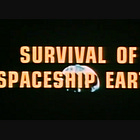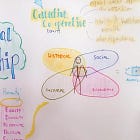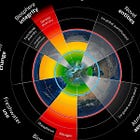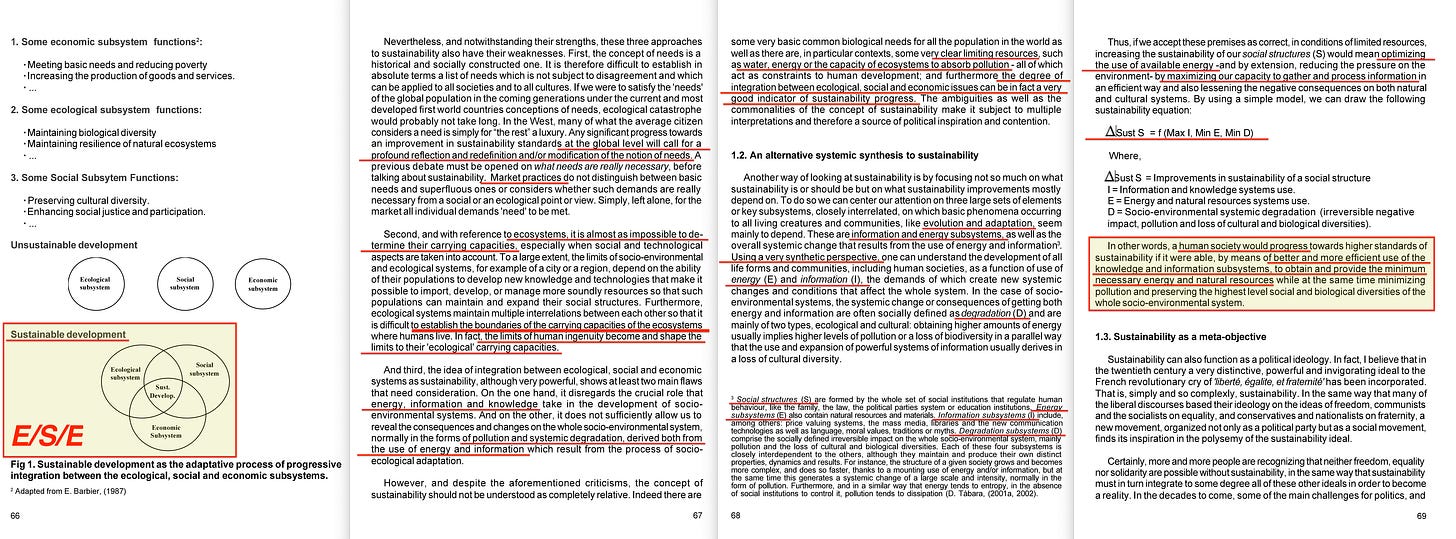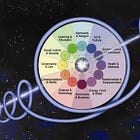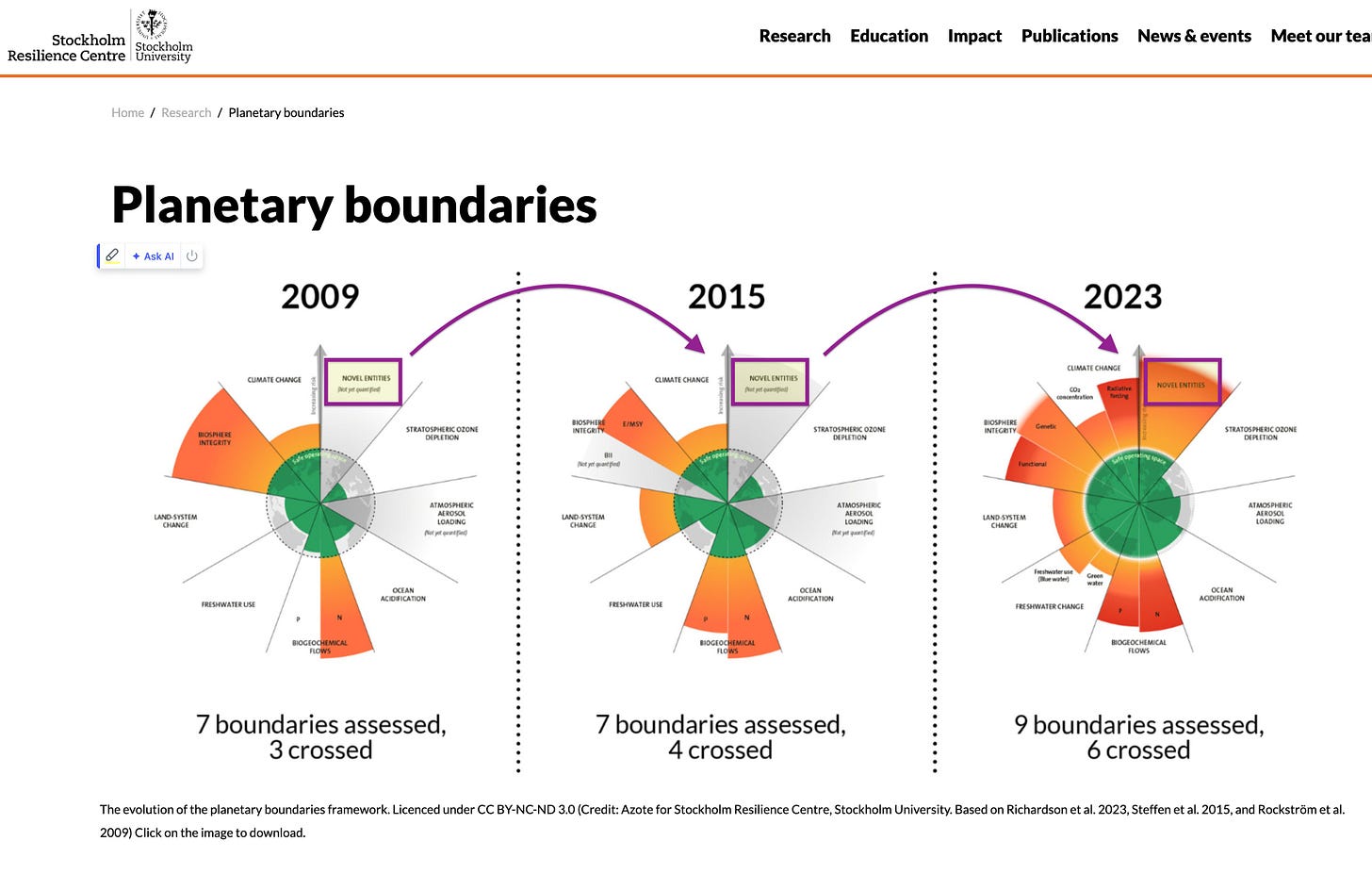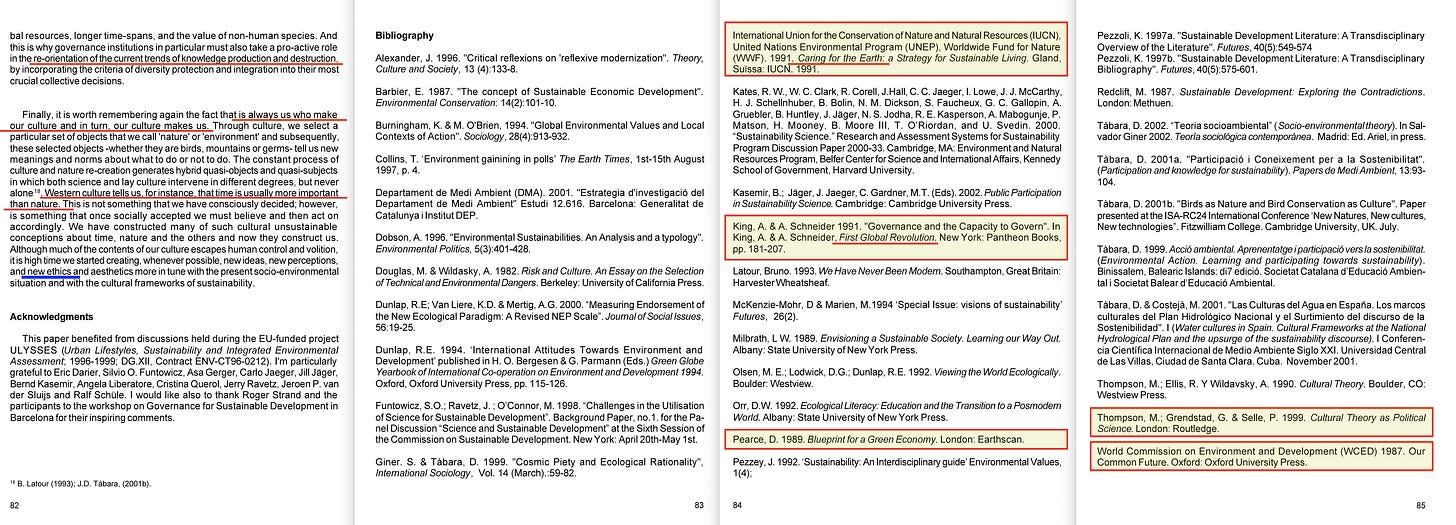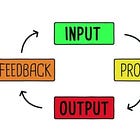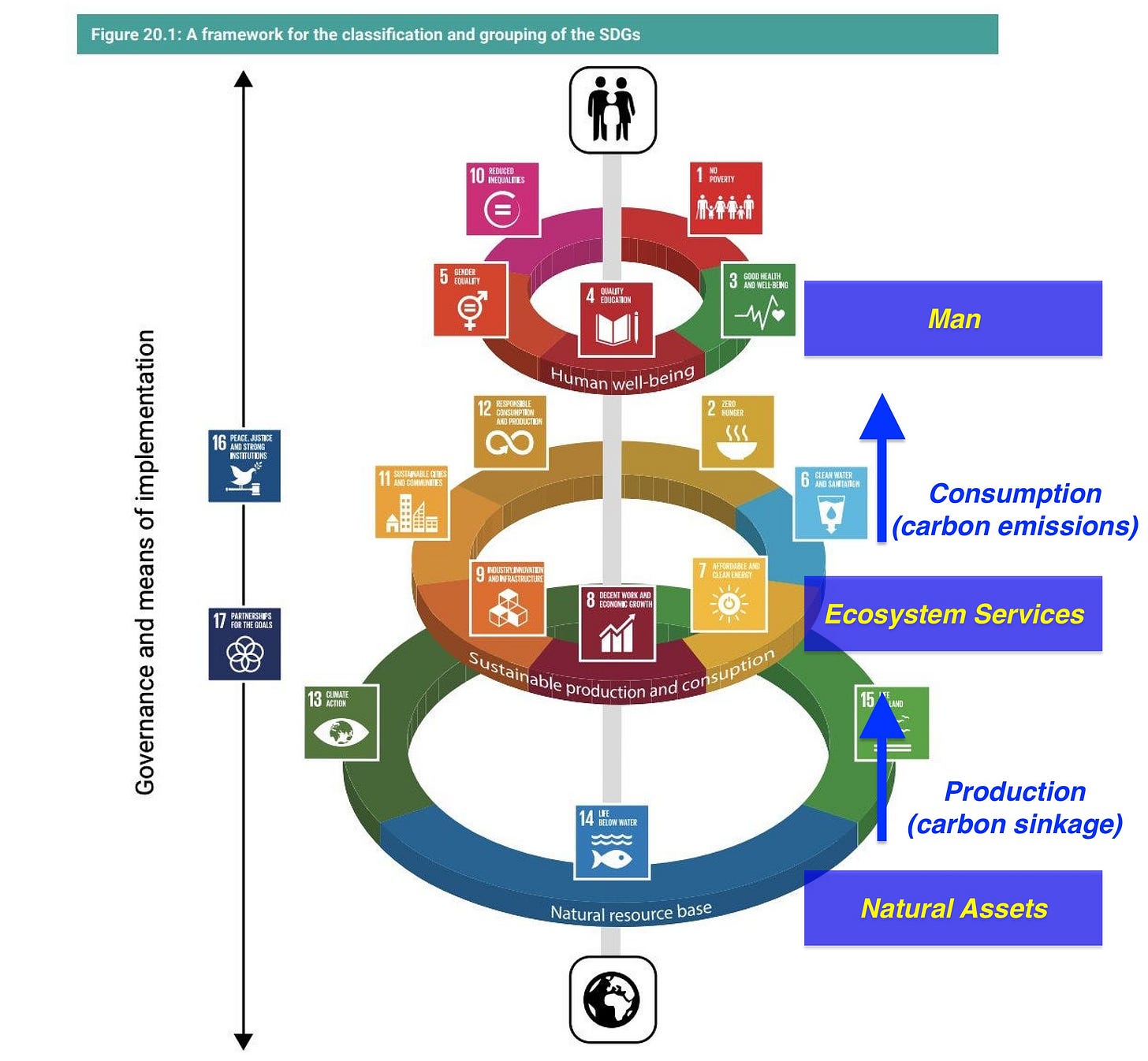Sustainability Culture
Around the time Zev Naveh released his hyper-Aesopian paper, The Total Human Ecosystem (2000), another paper by J. David Tabara was published that deserved far more attention than it received.
Zev’s contribution was previously covered here, and it’s important, because what it describes — in the most insanely Aesopian terms — is the development of humanity as a monitored and cultured species, with all visions of freedom and liberty in the rear-view mirror — forever. Its development would constitute a complete surveillance society, where each and every human is weighed, compared, and dismissed as easily as every other ‘natural resource’.
But there are two aspects to the development of this dystopian future. One is the technological revolution, founded on systems theory, which is well developed already. This will progressively fuse into a system relying on complete, global surveillance, where this surveillance data, through general systems theory models, is processed through the development of a global digital twin — such as DestinE1 — capable of hypothetically predicting the future. And on the basis of this future prediction, we can base policy and future action taken, where said prediction, through the closed-system Spaceship Earth metaphor, relates to resilience, and the manipulation of feedback loops within constitutes cybernetics. Once the future arrives, outcome will be compared to expectation, and policy adjusted automatically — forever.
And this all describes active adaptive management, and the Fourth Industrial Revolution relates to the creation of this automated, dystopian vision.
The other aspect of this development relates to the internal development of man. Because having machines dictate what you must do, trimming the flock along the way, and destroying their lives bit by bit tends to make people very, very angry. Consequently, a serious effort is channelled through internal development, and that is where the concept of ethics enters the game. The long-term objective? The cultivation of individual acceptance of being a cell within the human super-organism — in the most insanely deceptive way imaginable.
And it’s on this side of the coin Tabara’s paper from 2002 becomes remarkable. Titled ‘Sustainability Culture’2, it was first introduced at a workshop on sustainable development in Barcelona, and it determined that a new set of values was required in the synthesis of globalism, identity, governance and sustainability. And that — naturally — leads straight to a call for a new global ethic. And in context of timing, that slots in pretty much immediately after the Earth Charter had launched its Planetary Ethic, first suggested through IUCN’s Caring for the Earth (1991), and their World Conservation Strategy before that (1980).
See, we haven’t even arrived at the paper in question, and already, a whole range of topics covered on this Substack slot right into the picture.
The introduction further establishes that this new world order calls for a planetary equilibrium, and this in turn calls for a new type of governance — on a world scale, of course. But people will not ‘understand’ this unless ‘educated’ to this extent, as sustainable development fundamentally is a revolutionary concept, which demands action not simply from governments but from everyone in society. Consequently, education truly is of importance, especially as this ultimately reduces to a question of rights and responsibilities on both an individual level and as part of a group. But, again, education is called for, because otherwise people will quite simply not ‘understand’ what this ultimately is about.
Tabara then outlined that sustainability culture itself relates to the normative aspects of sustainable development, because it fundamentally is about ‘understanding’ a broader — universal — moral framework, which also takes into account future generations, non-human species, and global common resources, plus of course the matter of distribution of resources within society itself through economics. And to this end, people must come to ‘understand’ our ‘past mistakes’ in order to ‘modify’ our individual and collective behaviour through a reflexive learning process — though you can call it adaptive, should you prefer.
This, in turn, calls for radically addressing misconceptions relating to time, space and nature, which in turn calls for an ‘update’ to our cultural values, to integrate, essentially, sustainable development into our fabric of morality through culture. Or you can call that brainwashing, if you prefer. Amounts to the same thing — especially as it is deemed that ‘sustainability will eventually define itself’, which then also ties into the adaptive aspects above, though you may prefer the term ‘reflexive’.
Tabara next dives through the, essentially, IUCN documents which first outlined this vision, where their definition covers three aspects of sustainability:
preserves the essential ecological processes that maintain life and biodiversity
guaranteed the sustainable use of renewable resources and minimized the use of non-renewable ones
remained within its carring ecological capacity
And this, through an adaptive process of interacting character. We’ll return to the above three a bit later.
In short, sustainable development comes down to three primary factors — ecology, economics, and the social aspects of society. Ecology is frequently swapped for the environment, though perhaps ‘natural assets’ would be an even more apt description.
And this all calls for a ‘profound reflection and redefinition of the notion of needs’ on a global level, which in short can be more accurately described as a strategy of degrowth, as this ultimately relates to establishing the (planetary) boundaries of carrying capacity of the ecosystems in which humans live.
The protection of ecosystems calls for three main ingredients — energy, information and knowledge — where the latter relates to the reduction of pollution and systemic degradation. And this, in effect, means that the use of information and energy will be put to use in order to apply our knowledge with the aim of protecting our ecosystems. Because clearly, outer limits exist in terms of the natural production of clean water, and the ability of ecosystems to absorb pollution — which, in their terms, naturally includes carbon dioxide — and never mind this absolutely being plant food.
Consequently, we have four factors:
(S)ocial structures; organisational aspects of society
(E)nergy subsystems; resources and materials
(I)nformation subsystems; mass media, market-based mechanisms
(D)egradation subsystems; knowledge of pollution and planetary boundaries.
These are suggested as leading to a model where human society can be improved by the optimal use of energy, information and knowledge. And this is the central concept of the paper itself.
To this end, a need for the development of procedures (norms) and institutions (organisational aspects) is called for, and politics should thus be seen as the operational aspect of sustainability. Thus, a figure is shown outlining how meta-objectives (in our context, sustainability) become measures, then indicators, which are finally monitored.
And in the context of improving outputs, the synthesis of the meta-objectives with objectives themselves relates to our knowledge; objectives and measures relate to the communicated information; measures–indicators ultimately relate to differentials and thus energy expenditure; and the indicators–monitors relate to the monitoring of social structures — because ultimately, this is about balancing humanity within his environment, leading to sustainability.
And these four eerily align with the electric circuit parallel outlined in Silent Weapons for Quiet Wars.
This calls for the participation of large parts of society, as well as ‘integrated procedures to evaluate the adequacy of the objectives chosen and the options, measures and indicators taken’. Alternatively, you can call it surveillance, because that’s what it ultimately seeks to describe — surveillance turned into indicators, which are compared to expected outputs for the sake of adaptive management.
But, as said, people will obviously not readily accept this; consequently, they must be appropriately brainwashed through culture — which, of course, is more or less exactly what Bolshevik Party co-founder Alexander Bogdanov’s Proletkult seeks to do.
This further calls upon ‘constraints on our consciences’, thus a new universal moral framework, which will lead to a new way for us to ‘perceive, rationalise, moralise and prescribe reality’, thereby guaranteeing ‘the rights of future generations, and non-human species and the global common resources’. And never mind how deeply disturbing this all is, because Tabara assures us this is totally compliant with historical development — which I suspect is correct, but largely only in the context of the Soviet Union.
Either way, this in turn calls for new cultural frameworks, which can be understood as full-spectrum brainwashing of the same set of synthetic values through arts, education, science, media, literature — again, in explicit alignment with what Bogdanov outlined in terms of Proletkult. Further, Hermann Cohen even outlined the use of religion as an instrument of moral encoding through his 1904 book, Ethics of Pure Will.
And it’s in this context that the next interesting chain can be observed, through:
Perceptivity — what is important
Desirability — what to desire or avoid
Rationality — what is logical or not
Morality — what is right and wrong
Prescriptivity — outlining desirable future actions
This arrangement, however, fits even better if we were to rearrange two items, because then it can be understood as… Systems Theory:
Observation (perception)
→ Interpretation (reason)
→ Valuation (desire)
→ Judgment (morality)
→ Action (prescription)
And that is then immediately confirmed through the curious inclusion of ‘greater attention (must be) paid to systemic thinking’, and that these ‘cultural frameworks’ must incorporate new and extended conceptions of time, space, and rights — where the latter relate to both the future (already reflected through the prior mention of time) and to non-human species.
And that is then turned into a 3D figure, including a spatial, a temporal, and a natural/moral dimension — which I personally prefer to label ‘perspective’, as it is in effect a rebranding of the objective–subjective, which Alexander Bogdanov’s empiriomonism in effect establishes as a collectively subjective analysis of objective data. Besides, by instead focusing on the objective–subjective of this ‘moral’ perspective, this then also naturally leads to Ken Wilber’s Integral Meta-Theory3, where the temporal and spatial domains map naturally to Integral Theory itself: the spatial relates to the vertical individual–group structure (which can then be hierarchically cascaded to comprise ever-growing rings of society, from the person to the family, through the local community, regional, national, continental, and finally global perspectives), ultimately relating to a societal distribution of benefits and economics.
The temporal domain, meanwhile, relates to the internal–external dimension, as it is in effect a matter of ‘what is’ versus ‘what ought’, and thus relates to a direct expenditure of energy to affect tomorrow. The objective–subjective perspective then relates not only to first- versus second-order cybernetics, but also to the social aspects and the balancing of humanity with nature. The graph, in short, describes a 3-dimensional control, which then naturally slots in with Teilhard’s Omega Point and Conscious Evolution, as it will grant someone the ability to long-term control society through perspective, temporal, and spatial domains.
We then snap right back to the crucial importance of brainwashing — or, should you prefer, Tabara’s phrasing:
… a relation that is forged, mainlt through education and experience, between the individual and collective consciousness and the reality that surrounds it.
This, of course, is to take place through reflexive learning, because of course they haven’t yet invented the planetary boundary framework, which totally isn’t completely fraudulent — especially in the context of them in 2009 not knowing what the concept of ‘novel entities’ even entailed, by 2015 still weren’t sure, yet the figure provided somehow amazingly predicted the value shown by 20234, through a science essentially relating to the prediction of chaotic infinity.
The reflexive learning in this regard… wait, let me quote it:
The acceptance of sustainability as a reflexive learning process entails a radical change in many contemporary political attitudes and social sciences dealing with environmental problems.
And to this end:
Therefore, sustainability culture should then help people to become aware of past and current mistakes and abuses on social and natural systems and to modify such collective and individual worldviews and conducts accordingly.
Radical brainwashing through the use of manipulative social scientists, in short. This, further, allegedly calls for the preservation of cultural diversity — which actually is completely absurd, as this all leads to a progressive integration of all cultures in the name of sustainability. Sure, you’ll be allowed to wear that silly hat and the henna tattoos when you ‘celebrate your culture’ annually (which will next be monetised through postcards and memorabilia for ‘eco-tourists’), but apart from that, your culture will gravitate towards exactly the same as every other. But then again, I brand them ‘manipulative social scientists’ for a reason.
But we must further enlist other factors in this regard:
At a time when market and information society forces tend to erode both natural and cultural diversities, mainly by economic (mis) conceptions…
What Tabara is saying here is that market conception is incorrect. And this, of course, must be corrected — a problem for which a solution already exists.
But there’s a problem. Society is, quite simply, insufficiently democratic. And to that extent, a convenient solution was already outlined by Agenda 21. And, you know, back when I reviewed that particular document, that was my express conclusion.
Agenda 21 was a wishy-washy soft law document, utterly meaningless in itself. What Agenda 21 actually did, in the most incredibly deceptive manner imaginable, was to usher in the public–private–CSO governance model, which you could otherwise title ‘the stakeholder approach’. This, however, isn’t expressly correct, as it’s really important to understand exactly who’s in charge of that arrangement.
The Civil Society Organisation — where this arrangement also goes under a whole range of other titles.
See, one of the fundamental flaws of their system is that everything is fundamentally based on logic. But that leaves a serious problem behind, because all you have to do in order to decipher their structure is reverse-engineer their logic. And though the counterargument could be that they’d predict this, and thus leave blind alleys for those attempting to follow, I genuinely believe they’re so incredibly arrogant that they don’t think that’s even a remote possibility. And why do I believe so?
Because absolutely everything fits together, completely seamlessly. There is precisely 0% possibility I could have synthesised this cohesive structure if it did not. And, sure, while I’ve been wrong on a number of occasions — we all are — in the latter stages of life I’ve come to the realisation that it’s far, far better to choke those feelings of pride and accept it when you’re wrong, because it stops you from venturing in the wrong direction and thus — wasting time. But having said this, if your subconscious isn’t convinced about a counterargument, do sleep on it.
Either way, this is all a collective effort, and we all stand on the shoulders of giants.
Regardless, the meaningless terms which cover up for the destruction of democracy under claims of ‘participation’, ‘empowerment’ and ‘inclusion’ predictably follow — amusingly, eventually outright stating:
Sustainability demands that every group and every person is empowered enough to say something and to do something about it.
I presume Tabara’s got a solid idea of who’s to say what ‘enough’ entails, and that certainly will not consider a democratic vote in the slightest.
Regardless, education is again repeated in the name of avoiding ‘sustainability illiteracy’, which appears remarkably suspect, considering Tabara only earlier conceded that sustainability ‘hasn’t yet defined itself’. That, of course, is because the best scientific consensus available is that you must ‘trust’ or you ‘endanger our collective future’ — never mind when it once again ‘changes’.
The reality is that science is not a religion, but what Tabara is angling at is expressly that, outlined beautifully by Paul Carus through his book Religion of Science5; the very same Carus, incidentally, who also acted as chair of the 1893 Parliament of the World’s Religions6, in spite of being a raging scientific monist, with his idea of religion being comparable to that of Spinoza, who was excommunicated by leading rabbis of Amsterdam back in the 17th century.
Either way, what Tabara alleged that we do know is that the principle of maximising the use of information and knowledge to minimise the use of energy and resources, which takes us right back to his own equation, which fundamentally performs the express paradigm shift outlined through Donella Meadows’ Leverage Points, though she’s probably more famous for her contribution through the rather infamous Malthusian 1972 Club of Rome report — Limits to Growth7.
Finally, this all calls for us to seriously rethink the role of sciences and education, to radically reorient the current generation of knowledge towards the kind of knowledge established by closed environments of scientists who accept no counterarguments, nor discussion. Such environments predictably tailspin towards one facilitating obvious corruption, which then progressively necessitates censorship, ‘ethics codes’ with enforcement, ultimately resulting in a societal structure of forced compliance — or else.
All because the ‘science’ isn’t quite as ‘settled’ as they regularly proclaim.
Finally, Tabara regurgitates the necessity of using culture as a tool to facilitate brainwashing, because the future of humanity depends upon science which cannot even be defined at this stage, yet supposedly will ‘ensure the common environmental good, not only for present and future generations of humans’...
… because after all, we make the culture, and the culture makes us, which essentially absolutely aligns with every bit of Alexander Bogdanov’s conception of the use of Proletkult to shape the future Soviet Man — the collectivist cell in the human super-organism, without the shred of individual liberty, existing in a society with complete societal surveillance — forever.
And should you object… oh, don’t forget to get your periodic ‘vaccine’, or you won’t be able to leave your 15-minute city.
Consequently, what this all calls for is a new ethic, which of course must be global. It’s just that Tabara might as well have admitted that this new global ethic isn’t really about the environment at all.
It’s not merely that Tabara suggests using culture in the most horribly artificial way to subtly brainwash the people, which can now readily be observed through the borderline absurd recent encyclicals out of the Vatican.
It’s not merely that Tabara continuously weaves in claims of wrong information with science which isn’t known at this stage.
It’s not that the entire paper seamlessly integrates with Teilhard, Wilber, Agenda 21, Global Ethics, Bogdanov, Adaptive Management… nor is it that it integrates with all of them completely seamlessly.
What primarily undermines Tabara is the alignment of his proposed solution. Because the very same solution is expressly aligned with the Sustainable Development Goals themselves, which came to be 13 years later in 2015, and further — UNEP GEO6’s Long-Term Vision for 2050, detailed in 2019, which fundamentally divides the SDGs into four categories:
Governance and means of implementation
Human well-being
Sustainable production and consumption
Natural resource base
Because if you trace them in reverse, you find that the natural resource base provides ecosystem services (production, used by man for consumption). And that then aligns the bottom level with ecology/environment, the next with economics, and the third with society. And that, in turn, logically leads to ecosystem services being central to this strategy, as it is the production of these that needs to be sustainably balanced with the demands of mankind. And how is this to be ultimately balanced? Why, through governance and means of implementation, which looks suspiciously like an electric circuit inductor in a coil, consisting of human well-being as the resistance to ecosystem service conductance, ultimately leading back to the provision of said services, courtesy of the natural assets at the very foundation.
What GEO6 then outlines is a balancing of natural output with human demands through ecosystem services — and this even resonates with IUCN’s definition outlined above. And humanity’s balancing with nature — incidentally, was first outlined at UNESCO’s 1968 Biosphere Conference.
When Tabara spoke of market forces fundamentally having misconceptions, what he actually said was that the economy needs to be structured around nature’s output — the provision of ecosystem services. And that is easily done through the integration of economics with ecology through carbon-backed CBDCs.
Tabara outlines a system of control, under the guise of environmental science. Science, which he concedes, is not defined at this stage. Tabara’s primary focus is not environmental salvation, but control of human behaviour through the regulation of nature’s output, and this further calls for systems thinking, thus Adaptive Management, progressively changing cultural values, a new world order, continuous education, and consequently — a global ethic, ultimately brainwashed into the people through full-spectrum cultural engineering. This further expressly aligns with not only Bogdanov, but also UNESCO and WAAS. And to this end, politics operate as an enforcer of science—which they haven’t even defined at this stage.
But should you further return to his figure, you’ll see the top level is described as ‘meta-objective’, meaning it’s a convenient model for the future ‘meta-crisis’8 framework they presently attempt to establish under the guise of planetary boundaries. Consequently, what Tabara is actually seeking to do is create the systemic thinking to enable strict top-down authoritarianism, though this will be deceptively framed through continuous cultural brainwashing… incidentally enabled through cultural systems theory9.
What Tabara, through this paper, outlines is an incredibly manipulative argument for Bogdanov’s Scientific Socialism, through Bogdanov’s Empiriomonism converting allegedly objective data into a societal ethic, through Bogdanov’s Proletkult brainwashed through culture, and through a focus on adaptive management and systems science, leading back to Bogdanov’s Tektology. Bogdanov further created an early version of Input-Output Analysis through his work on supply chain analysis, and even conceptualised a full model of Spaceship Earth, all in the perspective of the circularity of one component of the atmosphere being pivotal: carbon dioxide.
The alignment, quity simply, is perfect. The emphasis on ‘reflexive learning’ further slots perfectly in with UNESCO’s present focus on life-long learning.
The statistical likelihood of all of this happening by chance is precisely zero percent.
And though there’s more to be discussed in terms of the integration of the electric circuit equivalent on display through Silent Weapons for Quiet Wars, let’s leave that for the time being for the sake of brevity.








